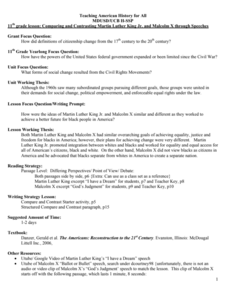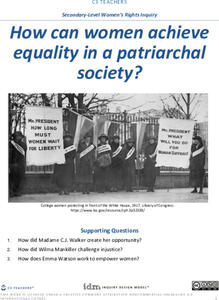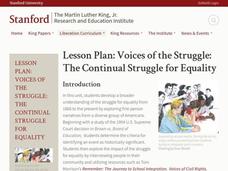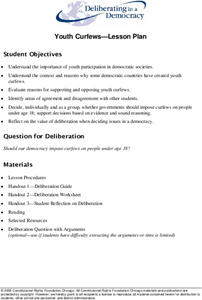Teaching Tolerance
Using Photographs to Teach Social Justice | Legal Action: The Supreme Court
A social justice lesson focuses on the Supreme Court case Loving v. Virginia which struck down laws that prohibited marriages between African Americans and white Americans. The lesson begins with class members examining a photograph of...
Teaching Tolerance
Using Photographs to Teach Social Justice | Advertisements Promoting Activism
Activism can create real change. Class members examine a series of photographs that represent a different form of activism. Individuals then craft a persuasive speech in which they argue why the photo they chose is the best example of...
PBS
Ken Burns: Jackie Robinson - A Journey Back to Separate but Equal Conditions
Baseball great Jackie Robinson fought for social justice. His efforts to push for equal access are detailed in an episode from from the Ken Burns: The Jackie Robinson Collection. After viewing the clip, class members engage in a series...
Just Health Action
How are Equality and Equity Different?
Equality does not equal equity. That's the take-away from a instructional activity that asks young people to consider what could be done to make a variety of situations more just, more equitable. After examining images that illustrate...
Rancocas Valley Regional High School
Teaching American History for All
Although Dr. Martin Luther King, Jr. and Malcolm X both work for equal rights, social change, and political empowerment, their approaches were radically different. To better understand these contrasts, class members compare King's "I...
Center for Civic Education
The Equal Rights Amendment in the 1970s and Today
Discover the fascinating history of the Equal Rights Amendment and discuss the major implications and considerations associated with it today. Here you will find background information on the topic, a graphic organizer summarizing...
C3 Teachers
Women’s Rights: How Can Women Achieve Equality in a Patriarchal Society?
Women today may not have heard of Madame C.J. Walker or Wilma Mankiller, and a few may not be aware of Emma Watson's current role; however, they have certainly benefited from their efforts. Using questions supplied by this guided...
Stanford University
Voices of the Struggle: The Continual Struggle for Equality
As part of a study of the Civil Rights Movement from 1868 to the present, class members examine first person narratives, the Supreme Court case Brown v. Board of Education, and other significant events in civil rights history. They then...
PBS
“He Named Me Malala”: Understanding Student Activism Through Film
Malala Yousafzai has become the face of social activism. After watching He Named Me Malala and short student-made films about what young people can do to become instruments of change, class members reflect on what it means to be an...
K20 LEARN
Civil Rights for All: Civil Rights Movement
The Civil Rights Movement was only the beginning. Using images and a series of queries, learners consider current fights for equality. After viewing video clips profiling the women's rights movement, the American Indian Movement, and...
Humane Education Advocates Reaching Teachers
Justice for All - Educating Youth for Social Responsibility: Grades 6-8
Teach middle schoolers how to develop healthy relationships with activities and lessons designed to create a kind and inclusive
classroom. Pupils create guidelines to develop a safe and civil learning environment. They learn how to...
K20 LEARN
Plessy v. Ferguson: An Individual's Response to Oppression
After generating research questions rated to segregation, groups are given a primary source document (Jim Crow Laws, Black Codes, Plessy v. Ferguson, etc.) and craft a presentation that details the key elements of their assigned...
Center for Civic Education
The Power of Nonviolence: Rosa Parks: A Quest for Equal Protection Under the Law
Teach young historians about the historical legacy of Rosa Parks with a multi-faceted lesson plan. Pupils follow stations and use journals to explore prominent events, analyze primary resource documents, and engage in interesting...
PBS
Analyzing McCulloch v. Maryland
What happened in the Supreme Court case of McCulloch v. Maryland? The resource teaches the specifics of the case with a video and provided discussion questions covering issues such as precedent and the Supreme Court as an equal branch of...
Southern Poverty Law Center
Analyzing Gender Stereotypes in Media
Why might toy advertisers use gender stereotypes to sell their products? Young people think critically about media messages and its role in gender stereotyping with a thought-provoking lesson plan.
Just Health Action
Causes of the Causes: What Are the Root Causes of This Problem?
A "Causes of the Causes" diagram enables class members to examine the contributing factors to a problem. After reading a poem that models the process, class members, either in gorps or individually, diagram an issues they are passionate...
US National Archives
Documented Rights Educational Lesson Plan
How have groups struggled to have their unalienable rights recognized in the United States? Acting as a research team for the Human Rights Council of the United Nations, your young historians will break into groups to research how people...
State Bar of Texas
Baker v. Carr
Can the federal government override the state government to protect the citizens of the United States? The 1962 Supreme Court case Baker v. Carr outlines the issue of equal protection under the law. Scholars investigate with a short...
Anti-Defamation League
Martin Luther King, Jr. and Civil Rights
How far have we come and how far do we still need to go to achieve equality and full civil rights in the United States? Include a packet of materials collected in your observance of Martin Luther King, Jr. Day.
Facing History and Ourselves
Taking Ownership of the Law
The work of building and maintaining a democracy is, in the words of Justice William Hastie, "never finished." To better understand what Hastie sees as an ongoing building process, class members listen to a seven-minute podcast about two...
State Bar of Texas
Grutter v. Bollinger
A university decides not to allow a qualified scholar to enter its institution based on skin and gender—but this case is about a white female? The 2003 Supreme Court case Grutter v. Bollinger lays the foundation for open discussion and...
State Bar of Texas
Plessy v. Ferguson
Where did separate but equal originate and what does it mean? Scholars investigate the Supreme Court Case Plessy v. Ferguson. Using a short video clip, they analyze the impact the decision of legal segregation had on society in 1896....
Deliberating in a Democracy
Youth Curfews
Don't stay out too late! Scholars analyze the need for youth curfews in a democratic society. They examine primary documents, case studies, and short video clips to form their opinions and take a position on the issue. Holding a class...
Ohio Center For Law-Related Education
Four Activities: Thurgood Marshall and the Nomination and Confirmation of Federal Judges
The process of nominating and confirming federal judges can sound like a lot of bureaucratic hoops, but a resource breaks down the steps of the Supreme Court nominations in a simpler manner. Learners participate in four activities that...

























